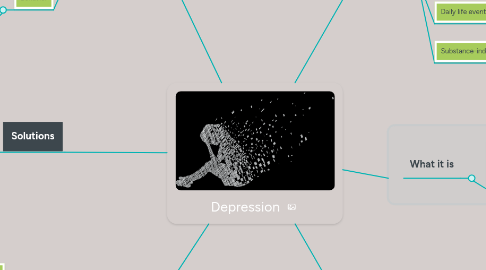
1. Consequences
1.1. Demographic
1.1.1. Untreated major depression may cause problems such as drug or alcohol addiction.
1.2. Physical health
1.2.1. Major depression patients could suffer of stroke or coronary artery disease. And also could change sleep patterns.
1.3. Behavior
1.3.1. It can ruin relationships, cause problems at work, and make it difficult to overcome serious illnesses. People who are depressed cannot simply “pull themselves together” and be cured.
2. Solutions
2.1. Get social support.
2.1.1. Strong social networks reduce isolation, so don’t hesitate to talk to trusted family members or friends
2.2. Stress reduction.
2.2.1. Take the aspects of your life that stress you out, such as work overload or unsupportive relationships, and find ways to minimize their impact.
2.3. Exercise.
2.3.1. Exercise boost serotonin, endorphins, and other feel-good brain chemicals, it effects the growth of new brain cells and connections, just like antidepressants do.
2.4. Nutrition.
2.4.1. Eating small, well-balanced meals throughout the day will help you keep your energy up and minimize moods
3. My suggestions
3.1. Don’t rely on medications alone.
3.1.1. People who are depressed cannot simply “pull themselves together” and be cured. Without proper treatment they must need antidpressants or/and psychotherapy.
3.2. What activities do you enjoy? Try to increase the amount of time you spend on these enjoyable activities.
3.3. Reward yourself for your efforts. Ask others around you to encourage and praise you for each small step you take.
3.4. Sleep
3.4.1. Sleep has a strong effect on mood 'cause when you don't get enough sleep you feel moodiness, sadness, and fatigue
4. Nobody knows exactly why occurs, but there are some posibilities
5. Causes
5.1. Personality
5.1.1. Personality indicators could be temporary but rapid mood changes, loss of interest and sleep disruption.
5.2. Sexual orientation
5.2.1. Those who are marginalized due to either their gender identity are more prone to depression.
5.3. Psychiatric syndromes
5.3.1. Problems such as social isolation due to other mental illnesses or being cast out of a family or social group, A number of psychiatric syndromes feature depressed mood as a main symptom.
5.4. Daily life events
5.4.1. Personal conflicts with family members or friends.
5.5. Substance-induced
5.5.1. Several drugs of abuse can cause or exacerbate depression, and from chronic use.
